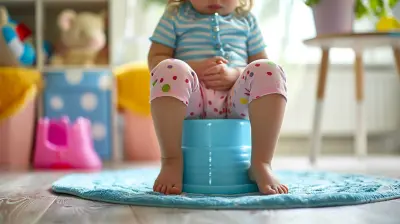The Power of Routine: Creating Stability for Children with Developmental Disorders
1 December 2024
As parents, we're all a little obsessed with the idea of routine. Let’s face it — routines help keep the house from turning into absolute chaos. But for children with developmental disorders, routines are more than just helpful; they’re essential. When you pair the unpredictability of life with the challenges faced by kids with developmental disorders, it's clear how powerful a routine can be in creating stability.
Why is a routine so important? How can it be harnessed to ease the difficulties faced by our children? We’re about to dive into the nitty-gritty and unpack how establishing routines can work wonders for children with developmental disorders.

Understanding Developmental Disorders
Before we go further, let's take a quick step back to clarify what we mean by "developmental disorders." These are conditions that affect how a child grows and develops over time. Some common examples include:- Autism Spectrum Disorder (ASD)
- Attention Deficit Hyperactivity Disorder (ADHD)
- Speech and Language Delays
- Learning Disabilities (like dyslexia)
Children with developmental disorders often struggle with things like communication, social interactions, or paying attention. Additionally, sensory processing challenges are common, meaning that even “small” changes in routine can feel overwhelming.
So, where does routine fit in? Well, when children face the added stress of developmental challenges, the structure of a routine can provide a sense of order and predictability — a comforting anchor in a chaotic world.

The Psychological Benefits of Routine for Children
Building a structured routine is like creating a map in a world that sometimes feels unpredictable. But the routine doesn’t just benefit you as a parent, it offers your child:1. A Sense of Security:
Imagine walking into a new place every single day, without any clue about what's happening next. Terrifying, right? Well, that's often how children with developmental disorders feel when their day lacks predictability. Routines provide them with a sense of security because, guess what? They know what’s coming next. When kids know what’s on schedule, it calms their anxiety and helps manage their behavior.
2. Reduction in Meltdowns and Anxiety:
For kids with developmental disorders, sudden changes in plans can cause anxiety and frustration. Whether it's something as routine as brushing teeth or getting ready for school, unpredictability can feel like walking on unstable ground. By setting a predictable structure, you give your child reason to trust that they can handle what's next — reducing the chances of emotional outbursts.
3. Improvement in Independence:
Routines provide children with consistency, which in turn helps them build autonomy. When something is predictable, they know what’s expected. Over time, they’ll learn to initiate tasks like getting dressed, brushing their teeth, or starting homework without constant oversight.
4. Enhanced Learning and Development:
Children with developmental disorders often thrive in repetition. When they know what’s coming next, it allows them to focus more energy on mastering new skills. Integrating time for learning into their routine means less stress, more consistency, and more opportunities for skill development.

How to Craft an Effective Routine for Your Child
So, you’re convinced that routines are vital — but how do you create one that works? Spoiler alert: It’s not one-size-fits-all. Every child is different, and what works for one may not work for another. Don’t worry, though. With a bit of trial and error, you can create a routine that supports your child’s emotional, social, and cognitive development.Here are a few golden rules to follow.
1. Start Small
Rome wasn’t built in a day, right? Neither will your child’s routine. Start by focusing on just one or two major parts of the day. It could be a consistent morning routine or bedtime ritual. Begin with what you know is a challenge for your child, and build from there. Small wins often lead to bigger successes.2. Visual Schedules
If your child has difficulty processing verbal instructions, a visual schedule can be a game-changer. Think of it as a roadmap for the day. Use pictures, symbols, or even simple words to represent each activity in the routine. You can create a chart or use apps designed for this purpose. Seeing what’s next helps your child anticipate upcoming tasks.3. Consistency is Key
This might seem obvious, but consistency is perhaps the most important part of any routine. Once you’ve established a routine, stick to it as closely as possible. Yes, life happens, and things can get off track, but the more regular and predictable you are, the more grounded your child will feel. Over time, the routine will become second nature, giving your child that all-important sense of stability.4. Flexibility (Within Reason)
Wait — weren’t we just talking about consistency? Yes, but hear me out. Even the most rigid routine has to flex from time to time. Maybe there's a sudden school closure, or you have a doctor's appointment that wasn't scheduled. For kids with developmental disorders, big changes can still be tough, so when you do make adjustments, explain them in simple terms and give a heads-up in advance when possible. Eventually, they’ll begin to adapt to these changes more easily.5. Create Routines Around Natural Breaks
Many of us have natural “transitions” in our day. Think morning, lunchtime, and bedtime. Try building routines around these transitions to give your child a stronger sense of what comes next.For example:
- Morning: Wake up, brush teeth, get dressed, eat breakfast.
- Afternoon: Lunch, playtime, quiet reading time.
- Evening: Dinner, bath, storytime, bed.
These anchor points provide a sense of predictability in the day, allowing your child to feel more prepared for each transition.

Tailoring Routine to Your Child’s Specific Needs
Not all kids are made the same, and neither should the routines be! Different disorders come with different challenges, and it’s worth considering your child’s individual needs when building a routine.For Children with Autism Spectrum Disorder (ASD):
Children with ASD often have heightened sensitivity to changes in their environment. Routine can be essential for them to feel safe. However, they may also struggle with transitions or multitasking. Here are some tips:- Use visual schedules.
- Break tasks down into smaller steps.
- Include sensory-friendly activities, like quiet time or specific sensory breaks, to help regulate emotions.
For Children with ADHD:
Children with ADHD often struggle with focus and impulse control. Their routines need to balance structure with flexibility. Tips include:- Include short, focused bursts of activity followed by brief breaks.
- Build in physical activities to burn off excess energy.
- Offer frequent positive reinforcement for completing tasks.
For Children with Speech Delays:
Children with speech and language delays may benefit from routines that emphasize communication. Here’s how:- Use visual cues and non-verbal instructions.
- Encourage communication during daily routines, like meal times and bedtime.
- Incorporate storytelling or reading as a bedrock of the routine to support language development.
Handling Setbacks: Because Life Happens!
No matter how amazing your routine is, setbacks are inevitable. Sometimes, things just don’t go according to plan. That’s okay. It’s important to manage your expectations and understand that flexibility is necessary to maintain sanity.When things go off the rails (and they will), use it as a learning opportunity. Your child’s routine doesn’t need to be perfect to be effective — it simply needs to provide structure and stability most of the time.
Acknowledge when things don’t go as planned and give yourself (and your child) grace. Sometimes, a little bit of extra patience goes a long way. Remember, it’s a marathon, not a sprint!
Involving Your Child in the Routine
Empower your child by involving them in the routine-setting process. It doesn’t matter how old they are — giving them some control instills a sense of responsibility and ownership.Start small. Ask them if they want to brush their teeth before or after getting dressed. Let them choose their bedtime story or decide in which order they'd like to do their homework and have screen time. By making the routine feel like a collaborative effort, they’ll be more likely to buy into it.
Celebrating Success
Finally, don’t forget to celebrate the wins! Building a routine for a child with developmental disorders can be a long, sometimes frustrating process. But each time your child follows through without a hiccup, that’s progress worth celebrating. Positive reinforcement goes a long way in reinforcing the power of routine.
Conclusion
The power of routine in creating stability for children with developmental disorders cannot be overstated. Routines provide a sense of predictability, reduce anxiety, foster independence, and promote better learning. While every child’s needs are unique, there's no doubt that a well-structured routine can be a game-changer for both you and your child.And remember, it’s not about perfection — it’s about creating structure and stability in a way that meets your child where they are. So start small, be consistent, and watch as your child flourishes in their newfound routine!
all images in this post were generated using AI tools
Category:
Special NeedsAuthor:

Noah Sawyer
Discussion
rate this article
12 comments
Haven Fry
Routines are the silent superheroes of childhood! They not only foster stability but also empower our kids with developmental disorders, helping them navigate their world with confidence and predictability.
February 3, 2025 at 4:56 PM

Noah Sawyer
Thank you for your insightful comment! I completely agree—routines truly play a crucial role in providing stability and confidence for children, especially those with developmental disorders.
Elizabeth McGivern
Thank you for this insightful article! Establishing routines is indeed vital for children with developmental disorders. Your practical tips will help many parents create a stable environment, fostering growth and confidence in their little ones.
January 26, 2025 at 4:15 AM

Noah Sawyer
Thank you for your kind words! I'm glad you found the tips helpful in supporting children with developmental disorders.
Blair McLemore
Routines provide essential stability for children with developmental disorders.
January 19, 2025 at 4:54 PM

Noah Sawyer
Absolutely! Routines create a predictable environment that can help children with developmental disorders feel more secure and support their growth.
Lola McCord
This article highlights the essential role of routine in fostering stability for children with developmental disorders. By providing structure, routines can reduce anxiety and enhance predictability, ultimately supporting children's growth. It’s crucial, however, to remain flexible, as each child's needs may differ, necessitating personalized approaches for optimal effectiveness.
January 16, 2025 at 4:26 AM

Noah Sawyer
Thank you for your insightful comment! I completely agree that while routines are vital for stability, flexibility and personalization are key to meeting each child's unique needs effectively.
Fennec Parker
This article beautifully highlights the importance of routine for children with developmental disorders. Establishing stability not only fosters a sense of security but also enhances their overall development and confidence.
January 11, 2025 at 5:37 PM

Noah Sawyer
Thank you for your thoughtful comment! I'm glad you found the article impactful in highlighting the importance of routine for children's development.
Jack Campbell
Routines offer children with developmental disorders a sense of security and predictability, fostering their emotional well-being and promoting independence through structured daily activities.
January 7, 2025 at 4:05 AM

Noah Sawyer
Thank you for your insightful comment! Absolutely, routines play a crucial role in providing stability and support for children with developmental disorders, enhancing their emotional well-being and fostering independence.
Nix Weber
Who knew routines could be the superhero sidekick in parenting? With a dash of predictability and a sprinkle of fun, we can turn chaos into cozy for our little ones!
January 2, 2025 at 3:42 AM

Noah Sawyer
Absolutely! Routines not only provide stability but also create a nurturing environment where children can thrive. Embracing predictability can truly make parenting a journey of joy!
Sylph McGill
This article highlights the crucial role of routine in providing stability for children with developmental disorders. Practical tips and insights make it a valuable read for all parents seeking support.
December 24, 2024 at 5:27 AM

Noah Sawyer
Thank you for your feedback! I'm glad you found the article helpful in supporting parents and emphasizing the importance of routine for children with developmental disorders.
Amalia McDowell
Establishing a consistent routine can truly transform the lives of children with developmental disorders. It fosters security and predictability, empowering them to thrive. Thank you for sharing these valuable insights and practical tips for nurturing stability!
December 12, 2024 at 6:06 PM

Noah Sawyer
Thank you for your thoughtful comment! I'm glad you found the insights helpful. Establishing a routine can indeed make a significant difference in children's lives.
Greta Powell
“Who knew that being a parent could turn us into master schedulers? Embracing routine not only gives our kids the stability they need but also transforms us into experts at balancing snack times with dance parties. Bring on the charting, and let the fun begin!”
December 11, 2024 at 4:54 AM

Noah Sawyer
Absolutely! Embracing routines not only provides stability for children with developmental disorders but also empowers parents to create joyful, balanced environments. It's all about finding that perfect rhythm!
Darius Alvarez
Great insights! Routines truly foster stability and growth.
December 7, 2024 at 4:54 PM

Noah Sawyer
Thank you! I'm glad you found the insights valuable. Routines can indeed make a significant difference!
Sylas Dodson
Establishing routines fosters security—your efforts truly make a difference!
December 2, 2024 at 3:30 AM

Noah Sawyer
Thank you! I'm glad you found the article helpful. Routines indeed play a crucial role in providing stability and security for children.
MORE POSTS

Dealing with Newborn Constipation: What You Should Know

How to Foster Independence in Your Child Without Feeling Helpless

The Ultimate Guide to Work-from-Home Success for Parents

Signs of Overstimulation in Newborns and How to Soothe Them

Raising Boys Who Understand the Importance of Community

How to Teach Your Kids About Online Safety

Tips for Traveling with Kids Without the Stress

How to Be Present at Home When Work Demands Your Attention